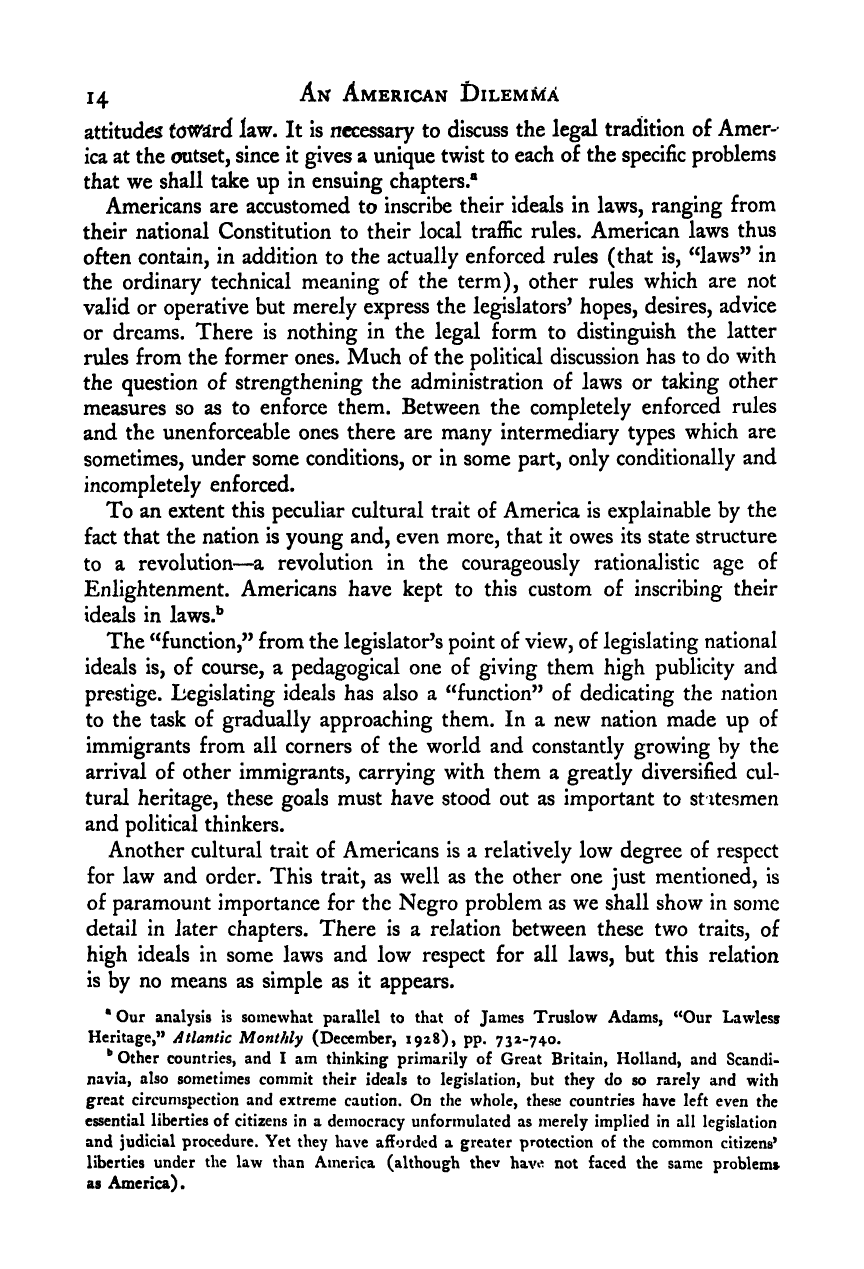Note: Gunnar Myrdal died in 1987, less than 70 years ago. Therefore, this work is protected by copyright, restricting your legal rights to reproduce it. However, you are welcome to view it on screen, as you do now. Read more about copyright.
Full resolution (TIFF) - On this page / på denna sida - I. The Approach - 1. American Ideals and the American Conscience - 8. The American Conception of Law and Order

<< prev. page << föreg. sida << >> nästa sida >> next page >>
Below is the raw OCR text
from the above scanned image.
Do you see an error? Proofread the page now!
Här nedan syns maskintolkade texten från faksimilbilden ovan.
Ser du något fel? Korrekturläs sidan nu!
This page has never been proofread. / Denna sida har aldrig korrekturlästs.
14 An American Dilemma
attitudes toward law. It is necessary to discuss the legal tradition of Amer-
ica at the outset, since it gives a unique twist to each of the specific problems
that we shall take up in ensuing chapters.®
Americans are accustomed to inscribe their ideals in laws, ranging from
their national Constitution to their local traffic rules. American laws thus
often contain, in addition to the actually enforced rules (that is, ^4aws” in
the ordinary technical meaning of the term), other rules which are not
valid or operative but merely express the legislators^ hopes, desires, advice
or dreams. There is nothing in the legal form to distinguish the latter
rules from the former ones. Much of the political discussion has to do with
the question of strengthening the administration of laws or taking other
measures so as to enforce them. Between the completely enforced rules
and the unenforceable ones there are many intermediary types which are
sometimes, under some conditions, or in some part, only conditionally and
incompletely enforced.
To an extent this peculiar cultural trait of America is explainable by the
fact that the nation is young and, even more, that it owes its state structure
to a revolution—a revolution in the courageously rationalistic age of
Enlightenment. Americans have kept to this custom of inscribing their
ideals in laws.**
The ^Tunction,” from the legislator’s point of view, of legislating national
ideals is, of course, a pedagogical one of giving them high publicity and
prestige. Legislating ideals has also a ^Tunction” of dedicating the nation
to the task of gradually approaching them. In a new nation made up of
immigrants from all corners of the world and constantly growing by the
arrival of other immigrants, carrying with them a greatly diversified cul-
tural heritage, these goals must have stood out as important to statesmen
and political thinkers.
Another cultural trait of Americans is a relatively low degree of respect
for law and order. This trait, as well as the other one just mentioned, is
of paramount importance for the Negro problem as we shall show in some
detail in later chapters. There is a relation between these two traits, of
high ideals in some laws and low respect for all laws, but this relation
is by no means as simple as it appears.
• Our analysis is somewhat parallel to that of James Truslow Adams, “Our Lawless
Heritage,” Atlantic Monthly (December, 19x8), pp. 732-740.
**
Other countries, and I am thinking primarily of Great Britain, Holland, and Scandi-
navia, also sometimes commit their ideals to legislation, but they do so rarely and with
great circumspection and extreme caution. On the whole, these countries have left even the
essential liberties of citizens in a democracy unformulated as merely implied in all legislation
and judicial procedure. Yet they have afforded a greater protection of the common citizens*
liberties under the law than America (although thev have not faced the same problems
as America).
<< prev. page << föreg. sida << >> nästa sida >> next page >>